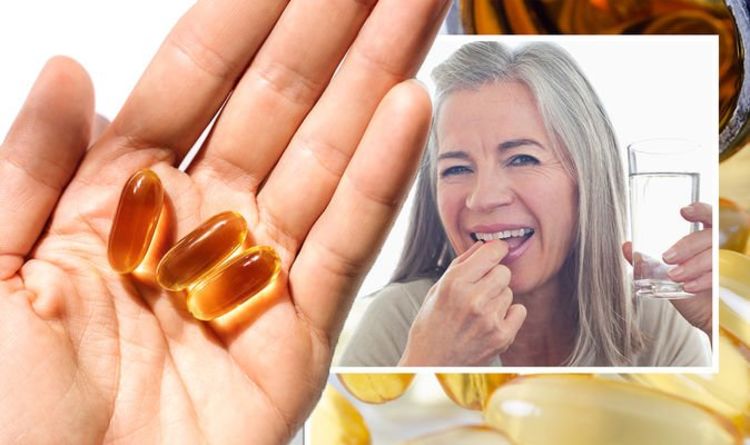Vitamin D supplements: The best type of vitamin D supplement to avoid a deficiency
Lorraine: Dr Amir says spine could shrink if deficient in vitamin D
We use your sign-up to provide content in ways you’ve consented to and to improve our understanding of you. This may include adverts from us and 3rd parties based on our understanding. You can unsubscribe at any time. More info
Vitamin D is essential for several bodily functions and has even been proven to help the body fight coronavirus. Known as the sunshine vitamin, many Brits often suffer from a deficiency of vitamin D during the winter and use supplements to boost their intake – as recommended by the NHS. With a range of different versions of vitamin D available for everyday use, which ones work the best?
What is the main function of vitamin D?
Vitamin D is essential for our general health and wellbeing and is well received by virtually every gland in the body.
This vital substance aids the body in several ways, from boosting the immune system to regulating brain function and reducing inflammation.
When the body is lacking in vitamin D, it can trigger a wide range of symptoms including low moods, depression, sleep disorder, skin conditions and has even been linked to gum disease.
As such a fundamental part of the body’s normative functions, supplementing vitamin D during the winter is essential, says the NHS.
The NHS said: “Government advice is that everyone should consider taking a daily vitamin D supplement during the autumn and winter.
“Children from the age of one year and adults need 10 micrograms of vitamin D a day.”


What is the best type of vitamin D supplement?
From late spring to early autumn, most people in the UK can source their full vitamin D intake from natural sunlight alone.
While supplementing this intake during winter can come from other natural sources like certain foods, many alternatives come in the medical form of tablets or capsules.
Vitamin D3 is the more powerful type of the two forms of vitamin D as it raises vitamin D levels almost twice as much as vitamin D2.
Opting for vitamin D3 supplements is twice as effective, but the way you choose to consume it could also play a role in boosting your intake.

Choose sprays over capsules
Oral supplements are simple and easy to take – but there is one major disadvantage.
Digesting capsules or tablets which contain vitamin D3 can quickly make them ineffective as the body tries to absorb the substance.
Speaking to the Telegraph, Pharmacist Shabir Daya from Victoria Health said: “The stomach is extremely acidic (PH 1) so it’s estimated that 40 to 50 percent of any vitamin you take orally is lost through the digestive system.
“If you prefer taking a pill, go for at least 1,000 units to ensure you meet the daily 400 units of vitamin D per day.”
Spray supplements are an effective way to bypass the digestive system and channel the vitamin directly into the bloodstream through blood vessels in the cheeks.
DON’T MISS:
Full Moon: The unusual link between fertility and the lunar sequence [INSIGHT]
Does a faint line on a lateral flow test mean you have Covid? [ANALYSIS]
How long can COVID-19 really live on surfaces in your home? [REVEAL]

Multi-vitamins
Combination supplements that contain a number of essential vitamins are a great way to boost your body’s supply of essential nutrients.
One downside of this is vitamins are often lower quality and have a lower dosage when multiple ingredients are combined into one singular product.
Look for ‘luxury’ supplements with a combination of vitamin D3 and vitamin K2.
This super-charged combination activates the D3 and encourages calcium absorption, which can’t be built into the bone unless K2 is present.
Vitamin D2 is often used in some products because it’s much cheaper, but half as effective as D3.
Don’t skimp on vitamins. Often the higher the price, the better the quality.
See the latest Covid vaccine stats below and visit InYourArea for all the Covid vaccine latest
How can vitamin D help the body fight Covid?
Vitamin D is essential for the body all year round, but it has proven even more beneficial in the eyes of scientists since the start of the pandemic.
A study led by scientists from the University of Barcelona found patients prescribed calcifediol (an intensive dose of vitamin D), had their risk of admission into intensive care dramatically reduced while suffering from COVID-19.
At the time of the study, 10 percent of patients admitted to Hospital del Mar in Barcelona with coronavirus died within 30 days.
Early treatment with the high dose of vitamin D was found to reduce deaths to just 36 out of 551 patients.
Source: Read Full Article
